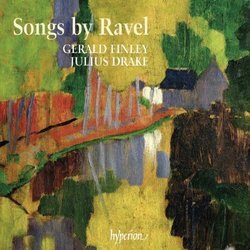| All Artists: Gerald Finley, Julius Drake Title: Ravel: Songs Members Wishing: 0 Total Copies: 0 Label: Hyperion Original Release Date: 1/1/2009 Re-Release Date: 6/9/2009 Album Type: Import Genres: Pop, Classical Styles: Vocal Pop, Opera & Classical Vocal, Chamber Music, Historical Periods, Classical (c.1770-1830) Number of Discs: 1 SwapaCD Credits: 1 UPC: 034571177281 |
Search - Gerald Finley, Julius Drake :: Ravel: Songs
 | Gerald Finley, Julius Drake Ravel: Songs Genres: Pop, Classical The award-winning partnership of Gerald Finley and Julius Drake continues their musical explorartions with this beautiful and thought-provoking disc. Finley's lustrous tones, extraordinary gift for characterization, and di... more » |
Larger Image |
CD DetailsSynopsis
Product Description The award-winning partnership of Gerald Finley and Julius Drake continues their musical explorartions with this beautiful and thought-provoking disc. Finley's lustrous tones, extraordinary gift for characterization, and direct, unaffected utterance make him an ideal and revelatory performer of Ravel's songs. These works, somewhat under-appreciated in the composer's oeuvre, demonstrate the endless variety and vast emotional scope of Ravel's musical sphere. Charming folk-song settings contrast with the almost surrealist world of Histoires naturelles, which caused outrage at its first performance. In the words of Roger Nichols, who provides the fascinating booklet notes, From the sepulchral gloom of 'Un grand sommeil noir' to the final exclamation ' Je bois/ A la joie,' Ravel's songs embrace a whole world. Similar CDs
|
CD ReviewsGorgeous voice, estimable artistry Terry Serres | Minneapolis, MN United States | 10/11/2009 (5 out of 5 stars) "Ravel is hard to beat for a single-composer recital. His song output is nicely varied. Most of his mélodies are accessible but harmonically interesting, and his ability to create an atmosphere in the span of a single song is admirable. Finley has a handsome, full voice -- a far cry from the angular, meager voices that often specialize in this material. Yet he still commands the verbal finesse to do justice to the chromaticism of the Histoires Naturelles. These are spacious readings, where the limpid playing of Julius Drake brings out an unaccustomed lyricism. (Finley follows spoken rather than sung classical French pronunciation in this set.) Ravel's song catalog is small and excellent, so there aren't many rarities to be had here. Still, the three songs in the middle of the program are less common: "Un grand sommeil noir," "Les grands vents venus d'outremer," and "Sur l'herbe." The first of these is especially gripping, and with his robust lower register Finley manages its darkly elegiac expressionism well. The Deux épigrammes de Clément Marot are also relatively unknown, sometimes performed as choral pieces. Finley doesn't have quite the crystalline charm that Elly Ameling brought to these pieces, but his touch is appropriately light. Finley uses the security of his tone to impressive effect: imparting a sense of repose and poise to many songs; and to other songs a welcome passion and urgency. His "Kaddisch" is amazingly fluid, spiritual, and transporting. There is a throb to his voice at full volume that is enthralling. However, the closing is oddly off balance, with some choppy phrasing. This recital is a solid success. It offers beautiful singing, vivid communication, and a natural partnership between the duo. " AMELETTE RAVELETTE DAVID BRYSON | Glossop Derbyshire England | 12/12/2009 (5 out of 5 stars) "The respected musical sage Tovey described Ravel as `eclectic'. Tovey used the term in a sniffy sort of way: myself, I would agree with it as a description, but from me it would be a term of praise. Ravel is nothing if not internationally minded for one thing. Should we think of him as French or as Basque? Like most French (?) composers he was fascinated with the music of Spain, but one thing that makes this particular recital interesting is that it restricts the Spanish element to three rather lightweight songs about Don Quixote. The cultural diversity takes in Greece Italy and Scotland, plus `Hebraic' numbers in both Yiddish and Hebrew (if I'm not mistaken), and on top of the genuine French element there is one French song to a poem by Ronsard that is actually adapted from Latin - `Amelette Ronsardelette', from the dying Emperor Hadrian's little address to his own soul `animula vagula blandula'.
I would recommend any purchaser of this disc who is not already an expert in Ravel's songs to study the liner note thoughtfully, however much effort that takes. It's like ploughing through treacle as the author communes with himself about arcane musicological details to the exclusion of the rest of us, but it is genuinely illuminating in tracing the sequence and order of the composition of these songs. Ravel's eclectic taste went this way and that way, and if we want to appreciate his genius we have to follow him as best we can. Compared with Faure or Brahms, to say nothing of Schubert, Ravel did not turn out all that many songs. However their variety is astonishing. One number strikes me as verging on ridiculous, namely `Ye banks and braes', sung in the authentic Burnsian English to the original sentimental tune composed by whoever composed it and with a token amount of French fannying about by Ravel himself. At the other end of the scale is the setting of Verlaine's Un grand sommeil noir, which is about exactly what you think it is about, and which recalls nothing less than Schubert's Der Doeppelgaenger. That particular song benefits from a voice like Gerald Finley's, and so does the powerful penultimate Kaddisch, adroitly sequenced just before the lighter-weight number that concludes this fascinating series of 26 songs. You can read about both Finley and his piano partner Julius Drake in the liner, and it is no surprise to learn that they are experienced in working together. I had become familiar with Finley from Gardiner's great `Pilgrimage' series of Bach cantatas done in the year 2000, and what I had become familiar with was a superb resonant baritone and an equally superb technique and discipline. Finley seems just as at home in early 20th century French music as in the German school of two centuries earlier, and I am no more inclined to look for faults in his work here than there. It is all `French' enough for my taste, he seems to me to be alert to the kaleidoscopic variety of moods that these songs express, his voice suits all of them well enough although probably the more powerful ones best, and his piano colleague is with him all the way. We demand a high standard in recorded quality these days, we demand it rightly, and we are given it here, or at least to my own satisfaction. There is not all that much music by Ravel - someone has totted up about 16 hours of it altogether. So far as I am concerned that gives me no excuse for staying ignorant of any of it, this particular recital has advanced my own insight, and I recommend the experience to as many as I can." |



